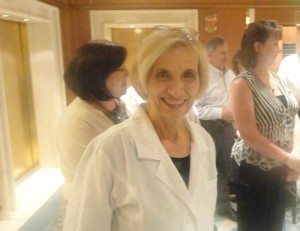++++++++++++++++++++++++++++++++++++++++++++++++++
…………………….……..What’s New!
Did you know that cognitive symptoms improve in Multiple Sclerosis (MS) when individuals work on a computer brain training program?
In a newly published study researchers at the New York University (NYU) Langone Medical Center showed that brain training had significantly greater impact on improving cognition in patients with Multiple Sclerosis (MS) than computer games
“This trial demonstrates that computer-based cognitive remediation accessed from home can be effective in improving cognitive symptoms for individuals with MS,” said Dr. Leigh Charvet, the study’s lead author. “The remote delivery of an at-home test and findings of cognitive benefit may also be generalized to other neurological conditions in which cognitive function is compromised.”
For more information
See: https://globenewswire.com/news-release/2017/05/15/984814/0/en/Study-Brain-Training-Improves-Cognition-in-Patients-with-Multiple-Sclerosis.html
Do you or someone in your family have trouble getting up in the morning?
Here is some help…an app The I Can’t Wake Up! Alarm Clock by Kog Creations.
It will not turn off until you complete some task like a math problem, memory pattern, or connecting word pairs. The alarm clock is available for android and iOS phones.
For more information
See: http://kogcreations.com/
Should older adults engage in computerized cognitive training (CCT) and will this reduce likelihood of dementia?
The evidence is that this training does improve your cognition as long as you do not already have dementia. It also helps those with mild cognitive impairment. It appears that “use it or lose it” still does apply.
For more information See: http://www.medscape.com/viewarticle/878163?nlid=114207_3002&src=WNL_mdplsfeat_170418_mscpedit_neur&uac=22720MV&spon=26&impID=1330
Why do depressed people often have thoughts of personal loss and low self-esteem?
Research by the University of Warwick in the UK and Fudan University in China’s research indicate that there is a physical root cause of depression. Find out more about their research.
For more information
See: https://simplecapacity.com/2016/10/scientists-find-physical-source-depression/
Did you know that damage accrued by cells in older muscles is especially severe and they don’t regenerate easily?
In a study conducted by researchers at the Mayo Clinic suggests that certain sorts of workouts may undo some of what the years can do to our mitochondria. Find out about this exercise.
For more information
See: https://www.nytimes.com/2017/03/23/well/move/the-best-exercise-for-aging-muscles.html?
Do you want to play computer games and become part of citizen science initiatives, tackling complex scientific problems?
The Allen Institute’s has a goal of cataloging the structure of neurons, the cells that transmit information throughout the nervous system. This information could one day help researchers understand the roots of neurodegenerative diseases like Alzheimer’s and Parkinson’s and their treatment.
For more information about the neuron game See:https://www.nytimes.com/2017/04/24/science/citizen-science-video-game-neurons.html
Why do you want to eat potato chips and cinnamon rolls when you are tired?
Scientists from Northwestern University found that adults showed significantly greater brain activity in their olfactory areas for food smells after 4 hours of sleep as compared to after 8 hours of sleep. Researchers believe this finding may be one more piece in the puzzle connecting stress, sleep deprivation, and overeating.
For more information
See: http://www.cogneurosociety.org/mycns/?page=poster_detail&id=10837
Did you know that climbing stairs may boost energy better than caffeine?
This study found that a brief bout of low-to-moderate intensity stair walking has transient energizing effects that exceed a low dose of caffeine for active young women with chronic insufficient sleep.
For more information
See: https://www.ncbi.nlm.nih.gov/pubmed/28302573
Do you want to improve your health?
All you have to do is learn some happiness skills and your immune system responds. Judith Moskowitz, Professor of Medical Social Sciences and Director of Research at the Osher Center for Integrative Medicine at Northwestern University Feinberg School of Medicine and colleagues designed the tools based on evidence showing these particular skills increase positive emotions. There are 8 skills listed.
For more information See:Northwestern University. “Teaching happiness to men with HIV boosts their health: Learning skills for positive emotions result in less HIV in blood and less anti-depressant use.” ScienceDaily. ScienceDaily, 17 April 2017.
http://www.sciencedaily.com/releases/2017/04/170417131010.htm
How can you become more creative when you travel to a foreign country?
The important thing to remember is to engage with, immersing in, and adapting to the local culture. Don’t just stay on the sidelines.
For more information See:
https://www.theatlantic.com/health/archive/2015/03/for-a-more-creative-brain-travel/388135/?utm_source=atlfb
![]()


